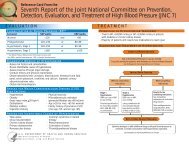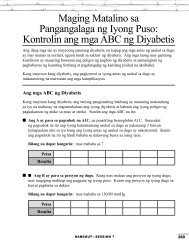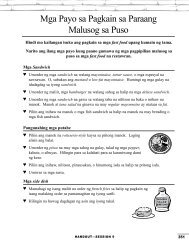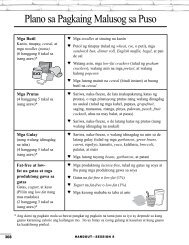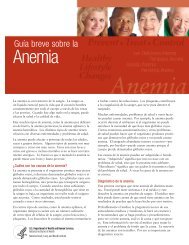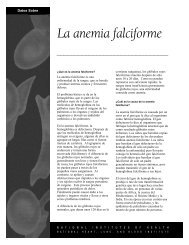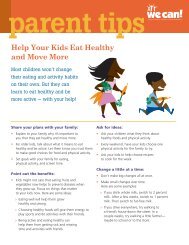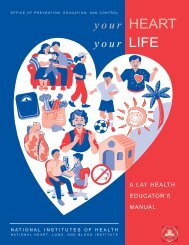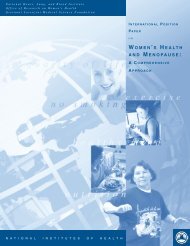HeartsNParks Community Mobilization Guide - National Heart, Lung ...
HeartsNParks Community Mobilization Guide - National Heart, Lung ...
HeartsNParks Community Mobilization Guide - National Heart, Lung ...
Create successful ePaper yourself
Turn your PDF publications into a flip-book with our unique Google optimized e-Paper software.
To Your Weight and <strong>Heart</strong> Disease I.Q. Test<br />
1 True. Being overweight increases your<br />
risk for high blood cholesterol and high<br />
blood pressure, two of the major risk<br />
factors for coronary heart disease. Even if<br />
you do not have high blood cholesterol or<br />
high blood pressure, being overweight<br />
may increase your risk for heart disease.<br />
Where you carry your extra weight may<br />
affect your risk too. Weight carried at your<br />
waist or above seems to be associated with<br />
an increased risk for heart disease in many<br />
people. In addition, being overweight<br />
increases your risk for diabetes, gallbladder<br />
disease, and some types of cancer.<br />
2 True. If you are overweight, even moderate<br />
reductions in weight, such as 5 to 10 percent,<br />
can produce substantial reductions in<br />
blood pressure. You may also be able to<br />
reduce your LDL-cholesterol (“bad” cholesterol)<br />
and triglycerides and increase<br />
your HDL-cholesterol (“good” cholesterol).<br />
3 False. The average weight gain after<br />
quitting smoking is 5 pounds. The proportion<br />
of ex-smokers who gain large amounts of<br />
weight (greater than 20 pounds) is relatively<br />
small. Even if you gain weight when you<br />
stop smoking, change your eating and<br />
exercise habits to lose weight rather than<br />
starting to smoke again. Smokers who quit<br />
smoking decrease their risk for heart<br />
disease by about 50 percent compared to<br />
those people who do not quit.<br />
58 Obesity & Overweight<br />
4 False. Weight loss, if you are overweight,<br />
may reduce your blood pressure even if<br />
you don’t reduce the amount of sodium<br />
you eat. Weight loss is recommended for all<br />
overweight people who have high blood<br />
pressure. Even if weight loss does not<br />
reduce your blood pressure to normal, it<br />
may help you cut back on your blood<br />
pressure medications. Also, losing weight<br />
if you are overweight may help you<br />
reduce your risk for, or control, other<br />
health problems.<br />
5<br />
6<br />
True. Even though a high sodium or salt<br />
intake plays a key role in maintaining high<br />
blood pressure in some people, there is no<br />
easy way to determine who will benefit<br />
from eating less sodium and salt. Also, a<br />
high intake may limit how well certain<br />
high blood pressure medications work.<br />
Eating a diet with less sodium may help<br />
some people reduce their risk of developing<br />
high blood pressure. Most Americans eat<br />
more salt and other sources of sodium<br />
than they need. Therefore, it is prudent for<br />
most people to reduce their sodium intake.<br />
True. Eating fewer calories and exercising<br />
more is the best way to lose weight and<br />
keep it off. Weight control is a question of<br />
balance. You get calories from the food<br />
you eat. You burn off calories by exercising.<br />
Cutting down on calories, especially<br />
calories from fat, is key to losing weight.<br />
Combining this with a regular physical<br />
activity program, like walking, bicycling,<br />
jogging, or swimming, can not only help<br />
in losing weight but also in maintaining



